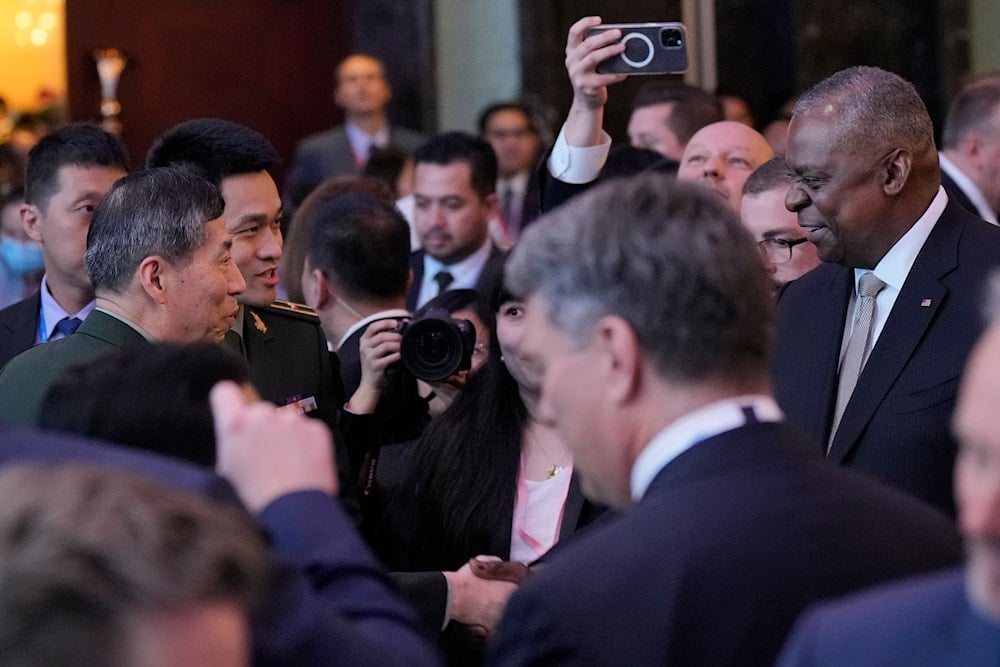US, China defense chiefs to hold rare talks in Singapore
United States' Lloyd Austin and China's Dong Jun are set to give speeches at the Shangri-La Dialogue starting May 31.
-

US Defense Secretary Lloyd Austin shakes hands during the 20th International Institute for Strategic Studies (IISS) Shangri-La Dialogue, Asia's annual defense and security forum, in Singapore, Friday, June 2, 2023. (AP)
The US and Chinese defense chiefs will hold rare direct talks in Singapore this weekend, offering hopes of further military dialogue aimed at keeping flashpoint disputes under control.
The meeting that will take place between the United States' Lloyd Austin and China's Dong Jun at the Shangri-La Dialogue will be the first substantive face-to-face talks between the defense chiefs of both countries in 18 months.
The Shangri-La Dialogue is an annual gathering hosting defense chiefs from around the world. It is set to start this year on May 31.
Austin and Dong are set to give speeches, in which they are expected to touch on a range of their nations' pressure points, particularly Taiwan.
Following a summit between Chinese President Xi Jinping and US President Joe Biden in November last year, both countries agreed to relaunch high-level military talks with Austin and Dong even talking over the phone in April this year.
At the Summit, Biden and Xi agreed to set up communications channels between the US and Indo-Pacific Command Chief and China's commanders responsible for military operations near Taiwan, Japan, and in the South China Sea.
US should tone down its support for Taiwan
A senior International Affairs Analyst with consultancy Solaris Strategies Singapore Mustafa Izzuddin told AFP, "The hope here is for the (Dong-Austin) meeting to be the beginnings of cautious rapprochement to re-establish military-to-military open lines of communication," further labeling such dialogue as "essential".
"It's exceptionally important because when we talk about what is happening in the South China Sea and Taiwan, it's essentially about defense and security," he added.
A Chinese Military Analyst and former People's Liberation Army Officer Song Zhongping told AFP that Dong's Singapore speech would likely include a call for the US to stop "provoking" China on Taiwan and the South China Sea.
"We especially want to warn certain countries from outside the region -- the US, Japan -- that interfering in the Taiwan Strait and the South China Sea will inevitably cause serious regional conflict," he said.
Song also hinted that the prospects of deeper US-China military dialogue would need the US to stop support for Taiwan.
"If the US cannot turn a new leaf on this issue, it cannot achieve results no matter who it speaks with," he said.
'Negative factors' growing in US-China relations despite stability
The United States is obstructing China's development, Chinese Foreign Minister Wang Yi declared on April 26 during a meeting with US Secretary of State Antony Blinken.
Blinken headed to China on a diplomatic visit back in April to discuss several key topics, such as enhancing bilateral relations, as well as regional and global matters that the US perceives as concerning and issues pertaining to responsibly managing competition to avert a possible miscalculation or conflict.
During the opening session between both officials, Wang Yi affirmed that the current diplomatic relationship between China and the US was stable, but still encompassed growing "negative factors".
"China's legitimate development rights have been unreasonably suppressed and our core interests are facing challenges," he explained.
In response, Blinken stated that the way forward with Presidents Biden and Xi Jinping's agenda was through "active diplomacy", which allows the US to recognize its differences with China to reportedly avoid miscalculations.
Ahead of the talks, US Treasury Secretary Janet Yellen expressed the US' aversion to taking options off the table in terms of responding to China's growing industrial capacity.
Yellen conveyed to Reuters Next during an interview in Washington that China achieving full employment through exporting is not deemed acceptable by the global community.
Blinken was also set to persuade China to cut alleged support for Russia's defense industrial base amid the war in Ukraine and make the case that the implications of China's alleged support for Russia are not in "China's interest going forward."

 4 Min Read
4 Min Read








